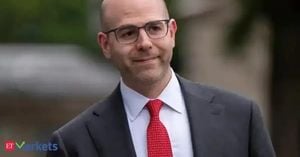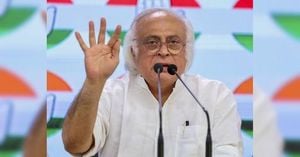The automotive industry is at a crossroads, grappling with the future of electric vehicles (EVs) and the shifting political currents influencing their path. Major automobile manufacturers, including Ford, General Motors, and Stellantis, find themselves endeavoring to interact diplomatically with President-elect Donald Trump, seeking to preserve the federal regulations promoting the sale of electric vehicles. This new approach highlights the industry's urgent need for stability and predictability amid tumultuous regulatory changes.
On November 14, 2024, the Alliance for Automotive Innovation, the group representing significant automakers, sent Trump a letter emphasizing the importance of maintaining the $7,500 tax credit for EV buyers, alongside the emissions standards initially instituted under President Biden. These policies are seen as pivotal to fostering the growth of EV adoption and ensuring the competitive stance of the United States on the global stage.
John Bozzella, the president and CEO of the Alliance, articulated the need for the new administration to present reasonable and achievable federal and state regulations. This reflects the industry’s concerns over the pace and feasibility of new regulations compared to current market conditions. While Bozzella did not fully oppose the stricter standards, he highlighted the necessity for adjustments considering the challenges posed to consumers and manufacturers alike.
One significant concern among industry experts is Trump's stated intent to roll back the emissions rules requiring manufacturers to cut carbon emissions dramatically by 2032. These rules, aimed primarily at increasing EV sales, are under scrutiny as Trump has declared them too restrictive. Industry insiders fear such deregulation could undermine their substantial investments—about $146 billion over the last three years—toward electrification.
Despite the tumult, the auto industry isn't entirely politicized; there's also the technical aspect of the transition to electric vehicles. Auto Trader reports forecast new car registrations to rise by 2% next year, reaching around 1.98 million. Nonetheless, this anticipated growth falls starkly short of pre-pandemic levels. It also poses significant challenges, particularly around the EV sales targets set forth by mandates, which remain out of reach for manufacturers. The Zero Emission Vehicle (ZEV) mandate requires 22% of new car sales to be electric, yet projections suggest the industry will only reach 18% by 2024.
The situation is particularly challenging for traditional manufacturers who are now adjusting their business models around EV production, all the more complicated by the fluctuative regulatory atmosphere. Automakers express the potential for their investments to be jeopardized by the shift back to less stringent regulations. Experts believe the EV market must expand at scale to reduce production costs, and recent trends suggest growth, albeit at a decelerated rate.
Meanwhile, the promise of autonomous vehicles (AVs) has also entered the conversation, with many industry leaders pushing for streamlined federal regulations to encourage faster deployment. Notably, Trump’s camp looks positively on the expansion of AV technology. The industry sees this necessity not just as competitive but as imperative if they hope to keep pace with advances coming from rivals, particularly from China.
Engagement is equally pragmatic as it is strategic; automakers hope to convey to Trump the volume of business, jobs, and tax revenues their investments generate—especially within states he won during the election. The focus on manufacturing facilities for EVs and batteries might appeal to Trump's interests. Linking the preservation of regulations to job growth could drive supportive policies from the incoming administration.
The successful navigation of this political terrain may also hinge on the powerful influence of Elon Musk. Tesla holds half of the U.S. EV market share and Musk’s relations with Trump can color industry outcomes significantly. Nonetheless, sources believe Musk’s focus will more likely shift to advocating for the acceleration of self-driving and autonomous vehicle technology rather than solidifying support for EV tax credits.
Looking down the road, industry advocates maintain optimism, envisioning electric vehicles overtaking gasoline-powered cars eventually. Yet the stakes are high: automakers are anticipating the potential of being overshadowed by their international counterparts if regulatory actions hinder progress at home. The abrupt retraction of emissions standards could disrupt extensive plans automakers already have based on expected regulations, jeopardizing their competitive edge.
Adding complexity, the reactionary nature of political leadership means industry stability is often at the mercy of the electoral winds. The consistent flip-flopping on auto regulations poses risks, leading experts to argue for maintaining the regulatory status quo, allowing manufacturers to adhere to uniform rules rather than competing under varying standards.
Meanwhile, the frustrations are palpable within the automotive industry, particularly against the buzzing backdrop of rising competition and shifting market demands. Alongside this, the prospects of economic recovery, fueled partly by green jobs associated with EV production and sales, offer the industry hope. But they tread carefully, aware of the challenges to maintain their foothold within the EV space against potential pullbacks from regulations they’ve long invested time and resources to adapt to.
Through it all, one truth remains clear—the electric vehicle future teeters on the edge of uncertainty shaped by political machinations, technological advancements, and global competition. The automakers must now engage not merely as car manufacturers but also as strategic players in the larger arena of policy-making.



